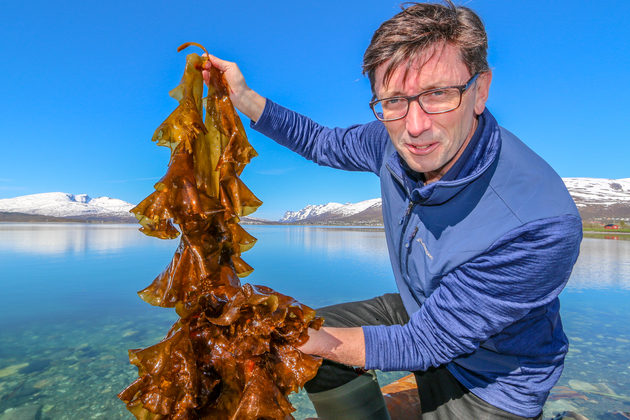ValueSøl
Producing high value macroalgae in Troms and Finnmark through advanced hatchery and production techniques

The ValueSøl project aims to improve the efficiency for dulce/søl (Palmaria palmata) sporeling production, to promote the production of dulce for human consumption with low carbon footprint and to evaluate dulce cultivation as a mitigating solution for aquaculture effluents discharged to the environment.
Start
19. Jan 2024
End
31. Jan 2026
Funded by
Regionale forskningsfond ARKTIS (RFF)
Cooperation
NRS Farming AS, Oceanfood AS, Lyngsskjellan ENK
Project Manager(s):
Other Participants:
Background
Norway aims to increase macroalgae production. However, active cultivation sites are still scarce and are concentrated towards the Western and mid-coastal regions. Today, there are only three small-scale macroalgae producers in Troms and Finnmark county: Oceanfood, Lyngsskjellan and Wandering Owl. Macroalgae cultivation shows great potential in Troms and Finnmark with delayed outbreak of epiphytic organisms and comparable biomass yield to that in Western and Middle Norway. Recent attention for cultivating the high value macroalgae species dulse is increasing due to its promising applications, attractive biochemical composition and functional properties. In Norway, 60 allocated areas have permission to grow dulse, but this species is still not grown in the sea.
Growing dulse directly or indirectly in effluent from Atlantic salmon recirculating aquaculture systems (RAS) can reduce the impact of dissolved effluent discharge by bioremediation. However, the growth, chemical composition and nutrient utilization of dulse need to be further investigated. Although there is no commercial cultivation of dulse in Troms and Finnmark county, the macroalgae producers in the area shows great interest in growing dulse.
Further, the protocols for hatchery and production of dulse have not yet been fully developed. For a sustainable and efficient production of dulse in Troms and Finnmark county, it is crucial to assess the production techniques on local scale and knowledge gained can be directly applied to the industry in this region.
Goal
ValueSøl’s primary objective is to produce the high value macroalgae species dulse for human consumption in Troms and Finnmark county with low carbon footprint and ecosystem benefits.
What we do
ValueSøl’s secondary objectives are to drive the research, development, and communication of the specific project tasks. The primary objective is divided into the following secondary objectives (SOs):
- Develop and optimize hatchery protocols for efficient sporeling production of dulse.
- Evaluate the growth and nutrient utilization of dulse cultivated in effluents from salmon land-based aquaculture systems.
- Investigate the effect of cultivation site and depth on the growth, biofouling and chemical composition of dulse cultivated on sea-based systems.
- Disseminate new knowledge of dulse production from both land and sea-based systems to the aquaculture industry and scientific community.
- Communicate the project results and outputs to the general public.
Worth knowing
Topics
Low trophic species
Similar projects